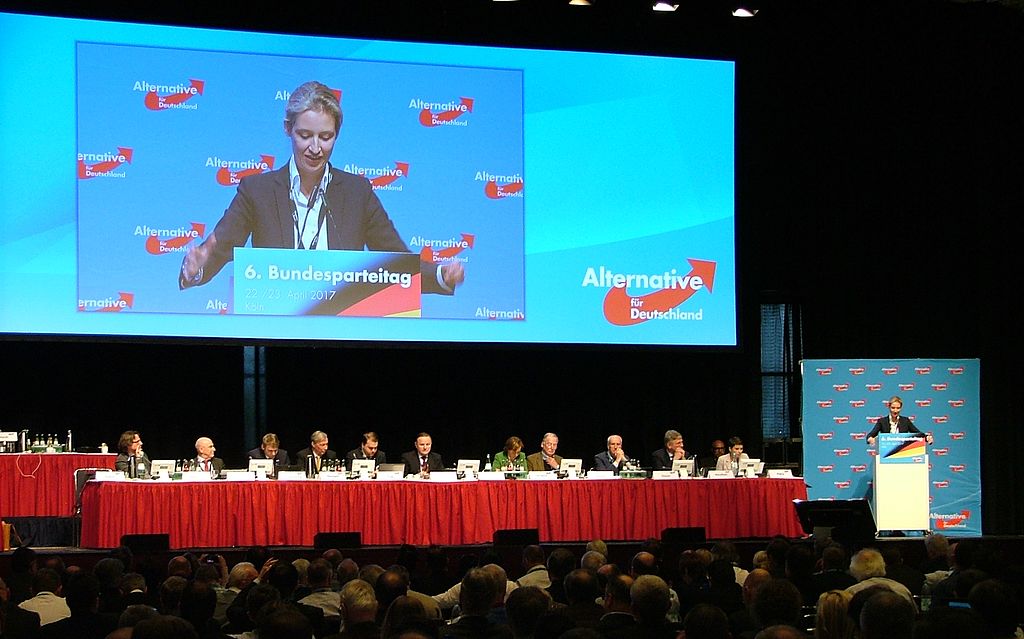“The AfD will hunt Merkel down. We will reclaim our country and our people”, is what party representative Alexander Gauland proclaimed in reaction to his party’s success in the German parliament election. The AfD (“Alternative für Deutschland”- engl. “Alternative for Germany”) gained 12.6% of all votes, making them the third-biggest fraction in the German parliament. For the first time in 50 years, a party to the right of the Christian-Democratic Union – lead by Angela Merkel – will move into the parliament. How long will the party’s success last?
From protest movement to popular opposition
The AfD was formed in Berlin in 2013 as a “party and citizens’ movement against the undemocratic and unjust arbitrariness”, as they put it on their website. Only a year later, they gained 7 seats in the European Parliament, as well as access to regional governments in Germany.
The party gained publicity through their controversial, conservative stances on issues such as the European Union, marriage equality for homosexual couples, immigration and asylum. In detail, the party advocated for Germany to leave the European Union, fully opposes gay rights – despite providing an openly lesbian woman as the chancellor candidate – and is continuously critical of Merkel’s refugee policy.
Now, the party is likely to become the new leader of the opposition. Werner Patzelt – political scientist working at University of Dresden, Saxony – highlights two main advantages of being the opposition leader in the German parliament: Being in charge of the chairmanship of the Committee of Budgets, as well as the right to be the first respondent to parliament decisions. Therefore, the AfD might be prone to gain even more political influence and also more publicity.
Power to persist?
What kind of policies is the AfD likely to push now that they gained a considerable amount of legislative power? According to NPR, one of the party’s main goals is the complete closure of the German border to refugees and immigrants, including the prohibition of subsequent immigration of family members, which up until now was possible for immigrants with a residence permit.
Moreover, the party favors the ban of headscarves and strongly advocates for Germany’s withdrawal from the Eurozone. However, party representative and election campaign manager Alexander Gauland failed to give concrete answers when asked about plans concerning retirement and health care reforms, as reported by the “Berliner Zeitung”.

DESCRIPTION: Locals protesting AfD’s party convention in Cologne, partially waving flags of the German left party “Die Linke”. Their signs say “Racists in sheep’s clothing”, (from left to right) “We are one” and “AfD is not an alternative”. Credit: Elke Wetzig, Wikimedia Commons.
“Electoral breakthrough is different from electoral persistence”, highlights Cas Mudde, who works at the Center of Research on Extremism at the University of Oslo, in his opinion piece about the AfD’s election success. Historically, it has been difficult for right-wing parties to not only establish a faction but also hold it together. Here it should be mentioned that no other German Party is willing to form a coalition with AfD, as NPR reported.
Moreover, Mudde states that AfD has a weak relationship to its voters, as the majority claim to be “against all other parties”, as opposed to voting for AfD out of sincere conviction. In addition, only 12 percent of the AfD-voters support chancellor candidate Alice Weidel, which makes her the least popular candidate within her own party and in all of Germany. Overall, Mudde doubts that the AfD will be a consistent force in the parliament.
Young party on shaky ground
Many political scientists, like Mudde in the referenced article above, predict that AfD will split into different, smaller groups as the legislative period progresses. In addition, one of AfD’s most famous party leaders – Frauke Petry – announced that she will not sit in the parliament as an AfD-representative, but as an independent representative, which was universally received as a surprise.
The voters themselves have heavily criticized the party for not clearly rejecting racist ideals and “distancing themselves from extreme positions”. In the eyes of their voters and even party members, it seems like AfD is failing to establish themselves as a real “alternative” to the established parties of the German political spectrum. Of course, frequent protests and public backlash against their conservative policies put pressure on the party as well.
AfD is a rather young party that began as a protest movement and turned into the third strongest force in the German parliament today. Their stances are controversial, which causes the party to face criticism from opposing parties and politicians, political activists and even within their own following. Whether they will be able to last in the German parliament, let alone successfully execute their ideas for policies, only time will tell.
By Annika Aries Müller
Photo credit:
AfD, Olaf Kosinsky, CC-BY-SA-3.0-DE
Köln stellt sich quer, Elke Wetzig, CC-BY-SA-4.0







